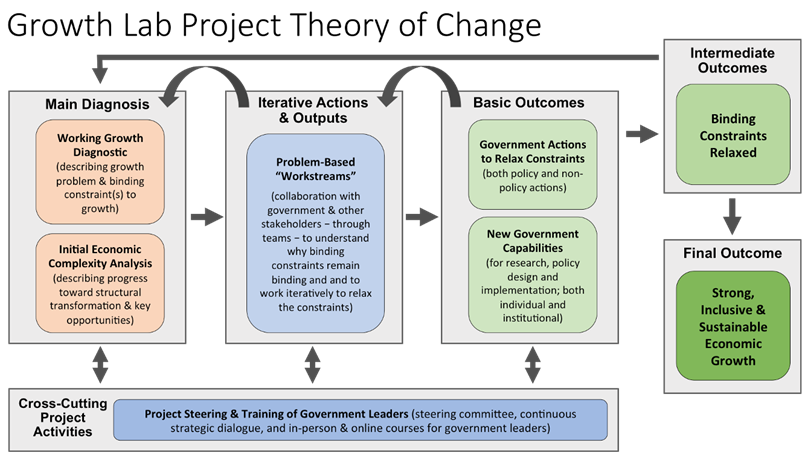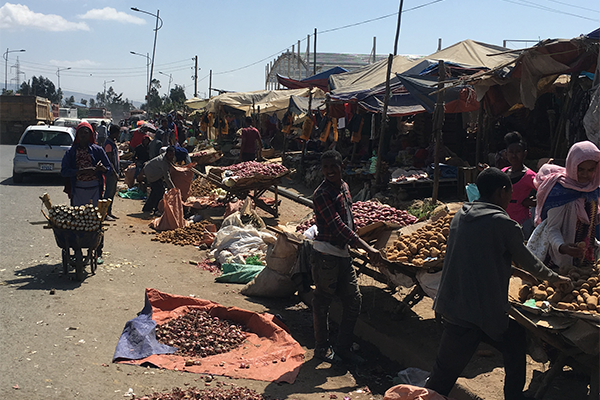The Growth Lab and the Government of Ethiopia initiated this engagement in 2019 to advance research, policy analysis, and knowledge sharing toward the goal of sustaining rapid and inclusive growth in the country. Over the three-and-a-half-year project, the Ethiopian economy faced pandemic, conflict, drought, and a range of other challenges.
Advancing Economic Diversification in Ethiopia
 This project worked in collaboration with the Government of Ethiopia (GOE) to apply two core frameworks (Growth Diagnostics and Economic Complexity) to diagnose growth constraints and identify opportunities to accelerate diversification and long-term job creation. Ethiopia faces a problem of slowing growth, which started several years prior to COVID-19 and civil war over the years 2020-22. This deceleration threatens to undermine gains in living standards and poverty reduction that Ethiopia has enjoyed over the last two decades. Through its iterative research and engagement, the project has introduced a new understanding (a syndrome explanation) of the interacting causes of Ethiopia’s growth slowdown and traced how the syndrome has been worsened through the pandemic and conflict.
This project worked in collaboration with the Government of Ethiopia (GOE) to apply two core frameworks (Growth Diagnostics and Economic Complexity) to diagnose growth constraints and identify opportunities to accelerate diversification and long-term job creation. Ethiopia faces a problem of slowing growth, which started several years prior to COVID-19 and civil war over the years 2020-22. This deceleration threatens to undermine gains in living standards and poverty reduction that Ethiopia has enjoyed over the last two decades. Through its iterative research and engagement, the project has introduced a new understanding (a syndrome explanation) of the interacting causes of Ethiopia’s growth slowdown and traced how the syndrome has been worsened through the pandemic and conflict.
More About this project
Ethiopia’s slowing growth traces directly to an inability to generate the sufficient foreign exchange to sustain its growth process, which has led to a series of increasingly severe macroeconomic imbalances. Without the ability to generate or borrow sufficient foreign exchange to pay for the imports that the economy demands, Ethiopia has been forced to ration imports, which has slowed growth and made the economy increasingly inefficient. Under existing macroeconomic policies, this has led to several critical vicious cycles, including a weakening of tax revenues, worsening (external) debt sustainability, and high and increasing inflation. In recent years, the Government of Ethiopia has launched multi-faceted macroeconomic reforms, yet these have struggled to address interacting macroeconomic distortions especially in the face of severe economic shocks, which have weakened foreign exchange generation and demanded government spending. The syndrome explanation has implications for government policy and strategy as well as lessons for more effective international support in the aftermath of conflict.
The project’s research compendium includes a growth diagnostic, macroeconomic diagnostic, collected analysis to inform diversification strategy, and a detailed review of the Government of Ethiopia’s Homegrown Economic Reform Program that was conducted in 2021 in coordination with the Ministry of Finance. Resolving the fundamental constraint of foreign exchange in the short-term is possible but requires international support alongside better sequenced macroeconomic reforms. Meanwhile, achieving inclusive growth in the medium-term will require accelerating diversification of Ethiopia’s exports such that the economy generates sufficient foreign exchange on its own. Project research has introduced novel inputs for accelerating Ethiopia’s diversification based on its current and potential comparative advantages. This, unlike macroeconomic improvements, will be a necessarily long process.
The engagement works across government ministries with senior officials at the GOE to: improve understanding of the structure of the Ethiopian economy and the constraints on its sustained growth; inform a new development strategy that addresses economic growth and transformation; and build a research base to analyze how to identify, prioritize, and implement policies and investment opportunities to drive transformation.

Over the course of this project, more than 100 applied research outputs have been produced, nearly 50 government and non-government representatives have been involved in iterative problem-solving efforts, and nearly 100 individuals have participated in formal training (including more than 30 in Harvard Executive Education programs). Nevertheless, growth has weakened since the start of the project as foreign exchange scarcity has increased and the conflict has had immense direct and indirect impact. The project’s research compendium proposes what will need to change to reverse this problem and allow for a sustainable peace dividend.
 Development in a Complex World: The Case of Ethiopia
Development in a Complex World: The Case of Ethiopia
This research compendium identifies a path forward for more sustainable and inclusive growth that builds on the government’s Homegrown Economic Reform strategy. It includes growth diagnostics and economic complexity research as well as applications to unpack interacting macroeconomic distortions and inform diversification strategies.
Economic Policymaking in a World of Deep Disorder
In this Development Talks seminar, Mamo Mihretu, Governor of the National Bank of Ethiopia, and HKS MPA 2009, discusses the economic reform programs currently being implemented in Ethiopia, the challenges they are facing, future prospects and some lessons learned in policymaking. The Growth Lab worked closely with Mr. Mihretu during our policy engagement in Ethiopia.
Team Members
- 1 of 2
- »
RELATED WORK
Atlas of Economic Complexity
Explore Ethiopia's Country Profile
Ethiopia ranks as the 108th most complex country in the Economic Complexity Index (ECI) ranking.








